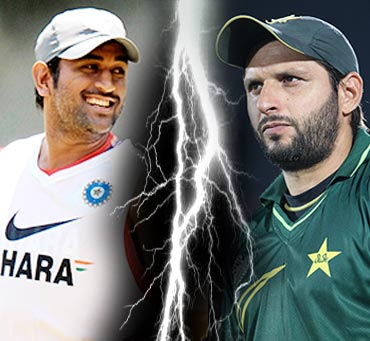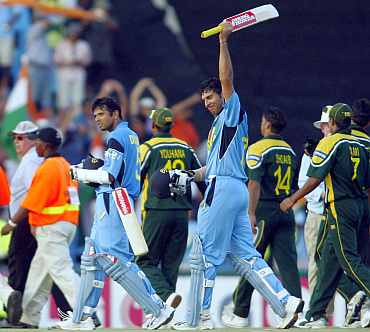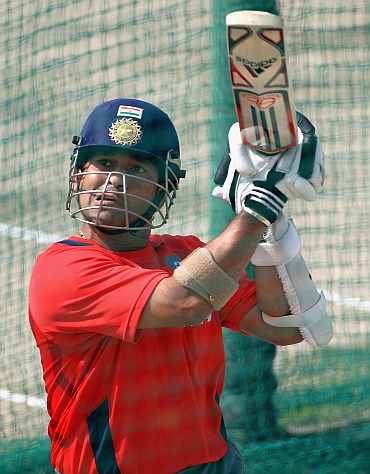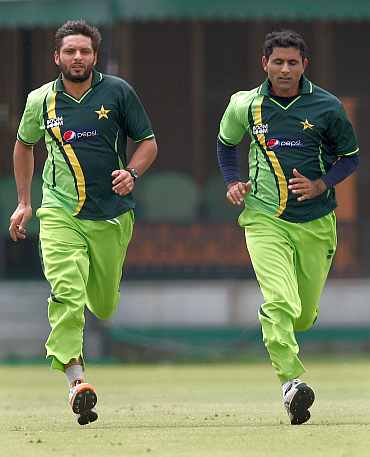 | « Back to article | Print this article |
Mother of all battles
Arch rivals India and Pakistan clash in the second semi-final of the World Cup on Wednesday. Prasanna D Zore tells us what's the match holds in front of a partisan Mohali crowd.
One-fifth of humanity, from two nations in the Indian sub-continent, will hold their collective breath for as much as eight hours on Wednesday, March 30, when India and Pakistan take on each other, in the mother of all battles at Mohali, in the first-ever semi-final in a World Cup between the two fierce cricketing rivals.
- Gul to target Tendulkar, Sehwag
A huge slice of this humanity will erupt in unparalleled joy if India emerges triumphant at the end of this match. If Pakistan comes out trumps it will be an even bigger sense of triumphalism for a nation that has one-seventh of the population of its neighbour with whom they had fought three wars off the cricket field and many more on it.
'Cup of Joy'
The probability of Pakistan trouncing India will depend on which side of the border you are (literally) on the one hand and law of averages and past record between the sub-continental rivals on the global stage that we all have labelled as the 'Cup of Joy'.
- Pak Min warns players against fixing
While the law of averages would give a higher probability of an outcome that Pakistan emerge victorious, past record would easily tip the balance in India's favour.
The two arch rivals faced each other for the first time in 1992 in Sydney in Australia, where India defeated Pakistan in the group matches. Having set a modest total of 217, Pakistan was bundled out for 173 runs. Interestingly, Pakistan went ahead to win this edition of the World Cup, riding on Wasim Akram's mesmerising swing bowling and Imran Khan's inspiring leadership, defeating England in the final.
The next time these two met in the quarter-finals of World Cup in 1996, that was hosted by the sub-continent, saw Ajay Jadeja, who scored 45 off 25 balls, smack pace ace Waqar Younis all over the Chinnaswamy stadium in Bangalore. Pakistan made a mess of this chase after getting a good start from openers Saeed Anwar and Aamir Sohail and lost by 39 runs, chasing India's 287.
2003 was perhaps the best India-Pak encounter
Sadly, India lost the semi-finals to another team from the sub-continent, Sri lanka. That match saw Vinod Kambli weep like a child and a Calcutta crowd that brought ignominy to India as bad losers.
The third time, India and Pakistan faced each other in the World Cup at Old Trafford in England; it was a repeat of 1992. India batted first and scored 227. Pakistan folded up for 180 in the Super Sixes format.
The fourth encounter between the two nations will be remembered as much for India's victory as for the superb contest between Sachin Tendulkar and 'Rawalpindi Express' Shoaib Akhtar.
While Shoaib managed to get Tendulkar out on 98 with a delivery that rose off the good length, India had the last laugh, as they cantered to surpass Pakistan's 273, with six wickets in hand and 26 balls to spare.
New day, new contest
But all this is past. March 30 will be a new day just like March 25, when the law of averages caught up with Australia as India defeated the defending world champions convincingly in a World Cup match after a gap of 24 years. The same can happen on March 30, too.
Nevertheless, history beckons itself on D-Day for both the nations, as they face each other for the first time in a semi-final in front of a partisan Mohali crowd.
Whoever wins on the day will get a chance to lift the World Cup trophy for the second time after a long hiatus during which populations of both the countries faced unprecedented social, economic and political upheavals.
Pakistan last won the World Cup under the leadership of Imran Khan in 1992 and Kapil Dev's 'Devils' a year less than a decade before that, in 1983.
This time too Pakistan is helmed by a handsome and wily Pathan from the lawless Federally Administered Tribal Agency, Sahibzada Mohammad Shahid Khan Afridi, who has toned down his flamboyance and aggression to lead a pack of men, many of whom would have exonerated themselves of match-fixing charges if they succeed in the next two matches.
Time to create history
The Pakistani 11, by their victory, would also give their countrymen, ravaged by intermittent bouts of rabid fundamentalism and terrorism that maims and kills scores of its citizens every second day, a big reason to cheer and also help them escape a sense of latent inferiority that invades them when they look at the political, social and economic progress made by their south-eastern neighbour.
Mahendra Singh Dhoni, as craftier as his Pakistani number, too would help his nation, searching desperately for probity in public life from its political masters, a chance to read front page headlines that will be devoid of words like scam, Adarsh, CWG, 2G, to count just a few on the fingers.
But come March 30, the 22 men belonging to these countries would have only one thing on their minds: A victory that will propel them to the biggest stage any cricketer gets to showcase his talent and skills, flamboyance and craft, attitude and mental toughness. And create history.
All these traits will manifest themselves in abundance as the two teams endeavour to outsmart each other in the presence of the irrespective Prime Ministers, who too will engage in a game of upmanship with scores of international reporters in attendance.




